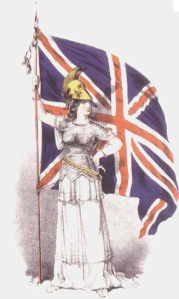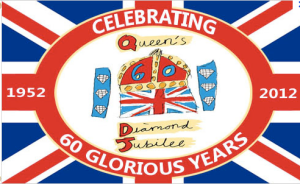 Jeremy Paxman in his Daily Telegraph article promoting his documentary series, Empire, takes time to reflect on how ‘Our Empire Was an Amazing Thing’. The possessive inclusive pronoun ‘our’ is tellingly exclusive. As I read it, though I know I am British, I did not recognise myself in the ‘our’. Why? The answer is simple. How could I when my ancestors were the very possessions of that empire? And so, it is hardly surprising to me that during these days of Jubilee-celebration-hysteria, many black and brown people across the country feel a deep unease. Paxman himself admits that ‘the empire was always a monarchical thing’ and it is our recognition of this fact, a fact that many white Brits seem ignorant of and which makes us some of this weekend’s harshest critics.
Jeremy Paxman in his Daily Telegraph article promoting his documentary series, Empire, takes time to reflect on how ‘Our Empire Was an Amazing Thing’. The possessive inclusive pronoun ‘our’ is tellingly exclusive. As I read it, though I know I am British, I did not recognise myself in the ‘our’. Why? The answer is simple. How could I when my ancestors were the very possessions of that empire? And so, it is hardly surprising to me that during these days of Jubilee-celebration-hysteria, many black and brown people across the country feel a deep unease. Paxman himself admits that ‘the empire was always a monarchical thing’ and it is our recognition of this fact, a fact that many white Brits seem ignorant of and which makes us some of this weekend’s harshest critics.
The British Empire was a terrible entity and as such, the wholesale nostalgia trip we are being forced to embark this weekend is all the more troubling when you remember that for many around the world, as head of the British Commonwealth, the Queen remains the primary symbol of British imperialism. Spanning the late 16th century to its height in the 19th and 20th, ‘our’ empire played an instrumental role in many dark moments of World history. From the transatlantic slave trade through to the Opium wars with China, which forced a reluctant Chinese government and population to accept British imported opium, to the British Raj where colonial misrule and greed caused the deaths of 85 million people in various famines- there are many many reasons why the British should hang ‘our’ heads in shame. However, the lie prevails that somehow, the British were the most honourable of masters because, Paxman again, ‘the unluckiest Africans got colonised by Belgians.’ The distinction is interesting if a little pointless, especially when you consider that the brutal King Leopold II, better known as ‘the butcher of Congo’, responsible for the deaths of millions of his African subjects, was the first cousin of our own Queen Victoria, the great grand mother of the current incumbent.
It is necessary to make these links in order to recognise that what is happening this weekend is directly linked to ‘our’ bloody past. It is not a coincidence that the last Diamond Jubilee was that of Queen Victoria’s in 1897. Then the British Empire was at its
height, in control of territories on all continents, ruling one quarter of the world’s population. However, under Queen Elizabeth II’s reign we have seen the dwindling of the British Empire and with it a growing sense of unease at what it means to be a Brit.
For many, the Jubilee celebrations are a chance to revel in nostalgia: to hark back to a time when British communities were closely knit, where neighbours celebrating together in streets adorned with bunting dutifully complemented national pageants and would spontaneously break into communal renditions of ‘Rule Britannia’. Like it or not, the ‘harmless’ nostalgia masks a deep apprehension about how we can now quantify Britishness. If we take the ‘rousing’ patriotic ditty, played every year on the last night of the BBC’s proms as our guide, being British was about Empire:
‘"Rule, Britannia! rule the waves:"Britons never will be slaves…To thee belongs the rural reign;
Thy cities shall with commerce shine:
All thine shall be the subject main,
And every shore it circles thine.
"Rule, Britannia! rule the waves:
"Britons never will be slaves."
The very conquering of foreign shores, Britain’s imperial might, symbolised by Sunday’s dismal flotilla, ensured that Britons would never have to suffer the indignity of being someone else’s slaves. The song is/was an opportunity to sing loud and proudly Cecile Rhodes’ advice that one should ‘remember that you are an Englishman, and have consequently won first prize in the lottery of life.’ The sense of supremacy empire endowed the British population with is now long gone. However, the desire to retain some of its power prevails. Paxman’s documentary series on it is merely an adult incarnation of Michael Gove’s plans to transform the English curriculum into something more ‘celebratory’ of empire. Everyone seems to be in agreement that it really wasn’t so bad. In fact, it was more than a violent acquisitive venture but also a civilising undertaking in which high British ideals such as honour and fortitude were disseminated across the globe. Just think, where would the booming economy of India be today were it not for the wonder of the British Raj, which left many of its citizens with the English lingua franca?
So, now that the actual power of empire is gone (I would argue that it remains a clear and present danger), what are people celebrating during the Diamond Jubilee? To me at least, it seems to be the reassertion of a British identity centred on a moral high ground. Yet the crowds that will gather are unwilling to recognise the imperialistic base this sense of British moral superiority springs from. The Queen, in her role as head of state and the ‘defender of the faith and supreme Governor of Church of England’ has in her largely politically silent role, become a national moral guardian. She stands for something pure and

untarnished, distinct from and unlike our political representatives, or their watchmen, the media, or indeed our civil protectors, the police. As a figurehead he sense of unexplained love that many feel from her comes from the sense of constancy she imparts onto a nation that has faced rapid social and economic change.
Though a very real emblem of empire, her reign spans the period of its rapid implosion, through a formidable PR machine she emerges and has been reconstituted as an active and important actor in the process of decolonisation. So, despite being wholly steeped in the enterprise of empire, the very base of British monarchical power, she is conveniently divested of its ills. British history books would now like to wrestle the agency and determination of peoples across the globe, who mobilised and co-ordinated long standing liberation struggles, away from them. The preferred view sees decolonisation as successful in part because of our current Queen’s own moral resolve and innate benevolence. To do otherwise would be to admit an inherit lack of power and thus superiority- but that wouldn’t do would it? It’s just not…British, is it?
The British did not lose their empire because their subjects had waged a long resistance, no, they relinquished it out of recognising it was a moral imperative to do so. This, for me is what the Queen has come to represent. The joyful crowds waving their Union Jacks proudly may well be oblivious to the fact, but it is hard to argue with. As a figurehead, the sense of unexplained love that many feel for her comes from the very sense of constancy she imparts onto a land that has faced rapid social and economic change. It is far more comforting to embrace the familiar rather than the new. Britain is a nation whose might has been significantly diminished on the world stage, however, our Queen offers us great ‘value for money’ because she continues to symbolise what was once.
Lola Okolosie

